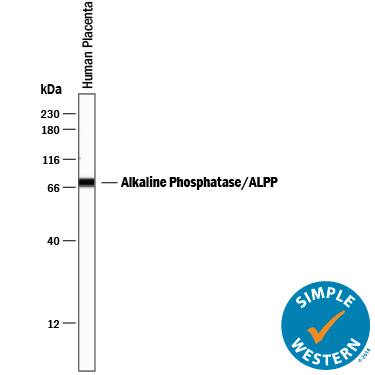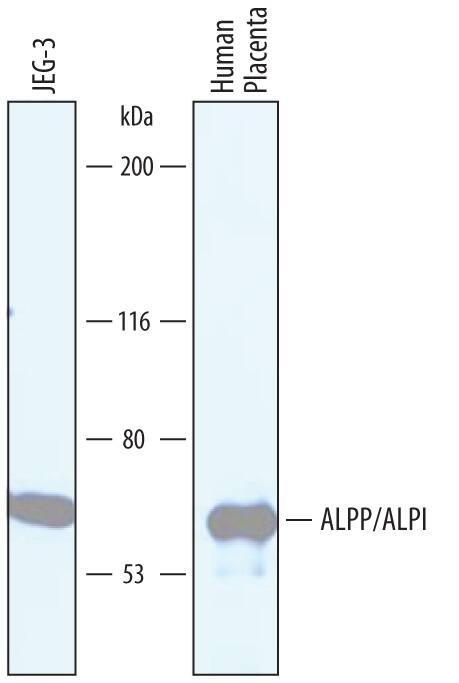Human Alkaline Phosphatase/ALPP/ALPI Antibody
R&D Systems, part of Bio-Techne | Catalog # AF5905

Key Product Details
Species Reactivity
Validated:
Cited:
Applications
Validated:
Cited:
Label
Antibody Source
Product Specifications
Immunogen
Ile23-Asp506
Accession # P05187
Specificity
Clonality
Host
Isotype
Scientific Data Images for Human Alkaline Phosphatase/ALPP/ALPI Antibody
Detection of Human Alkaline Phosphatase/ALPP/ALPI by Western Blot.
Western blot shows lysates of human placenta tissue and JEG-3 human epithelial choriocarcinoma cell line. PVDF membrane was probed with 1 µg/mL of Sheep Anti-Human Alkaline Phosphatase/ALPP/ALPI Antigen Affinity-purified Polyclonal Antibody (Catalog # AF5905) followed by HRP-conjugated Anti-Sheep IgG Secondary Antibody (Catalog # HAF016). A specific band was detected for Alkaline Phosphatase/ALPP/ALPI at approximately 68 kDa (as indicated). This experiment was conducted under reducing conditions and using Immunoblot Buffer Group 1.Detection of Human Alkaline Phosphatase/ALPP/ALPI by Simple WesternTM.
Simple Western lane view shows lysates of human placenta tissue, loaded at 0.2 mg/mL. A specific band was detected for Alkaline Phosphatase/ALPP/ALPI at approximately 76 kDa (as indicated) using 10 µg/mL of Sheep Anti-Human Alkaline Phosphatase/ALPP/ALPI Antigen Affinity-purified Polyclonal Antibody (Catalog # AF5905) followed by 1:50 dilution of HRP-conjugated Anti-Sheep IgG Secondary Antibody (Catalog # HAF016). This experiment was conducted under reducing conditions and using the 12-230 kDa separation system.Applications for Human Alkaline Phosphatase/ALPP/ALPI Antibody
Immunoprecipitation
Sample:
Conditioned cell culture medium spiked with recombinant human Alkaline Phosphatase/ALPP, see our available Western blot detection antibodies
Simple Western
Sample: Human placenta tissue
Western Blot
Sample: Human placenta and intestine tissues, and JEG‑3 human epithelial choriocarcinoma cell line
Formulation, Preparation, and Storage
Purification
Reconstitution
Formulation
Shipping
Stability & Storage
- 12 months from date of receipt, -20 to -70 °C as supplied.
- 1 month, 2 to 8 °C under sterile conditions after reconstitution.
- 6 months, -20 to -70 °C under sterile conditions after reconstitution.
Background: Alkaline Phosphatase/ALPP/ALPI
ALPP (Alkaline phosphatase placental type; also SEAP, PALP-1 and ALP) is a 66-68 kDa glycoprotein member of the alkaline phosphatase family of molecules. It is principally expressed by 2nd and 3rd trimester synctiotrophoblasts and tumor cells, and represents one of four alkaline phosphatase isozymes. Experimentally, it cleaves phosphate monoesters into alcohol and phosphate. Human ALPP is synthesized as a 535 amino acid (aa) preproprecursor. It contains a 22 aa signal sequence, a 484 mature region (aa 23-506), and a 29 aa C-terminal propeptide that is cleaved to generate a GPI linkage at Asp506. The ALPP gene is highly allelic and may generate three potential splice variants that involve the signal sequence. The ALPP enzyme utilizes one Mg and two Zn ions, and functions as either a homodimer, or a heterodimer with the related Intestinal (ALPI) and Germ cell (GCAP) family members on the cell surface. ALPP is reported to oligomerize under certain conditions. Over aa 23-506, human ALPP shares 96% and 77% aa identity with chimpazeee ALPP and mouse embryonic-type alkaline phosphatase, respectively. It also shares 88% and 98% aa identity with IAP and GCAP, respectively. Over aa 23-506, human ALPP shares 86% aa identity with human ALPI.
Alternate Names
Entrez Gene IDs
Gene Symbol
UniProt
Additional Alkaline Phosphatase/ALPP/ALPI Products
Product Documents for Human Alkaline Phosphatase/ALPP/ALPI Antibody
Product Specific Notices for Human Alkaline Phosphatase/ALPP/ALPI Antibody
For research use only

